Person-Centred Approach: Implementation in Adult Social Care
VerifiedAdded on 2019/12/28
|9
|3313
|209
Report
AI Summary
This report provides a comprehensive overview of the person-centred approach within the context of adult social care. It begins by defining the core principles of this approach, emphasizing the importance of individual values such as respect, dignity, and independence. The report then delves into the practical application of these values, highlighting how they should influence all aspects of social care work. Key areas covered include the use of care plans, the significance of establishing informed consent, the principles of active participation, and the importance of addressing an individual's holistic needs. The report also examines factors influencing consent, ways to promote active participation, and methods for supporting individuals in making informed choices and challenging decisions. Overall, the report underscores the need for a patient-centered approach to improve the quality of life for the patients.

UNDERSTANDING PERSON
CENTRED APPROACH
1
CENTRED APPROACH
1
Paraphrase This Document
Need a fresh take? Get an instant paraphrase of this document with our AI Paraphraser
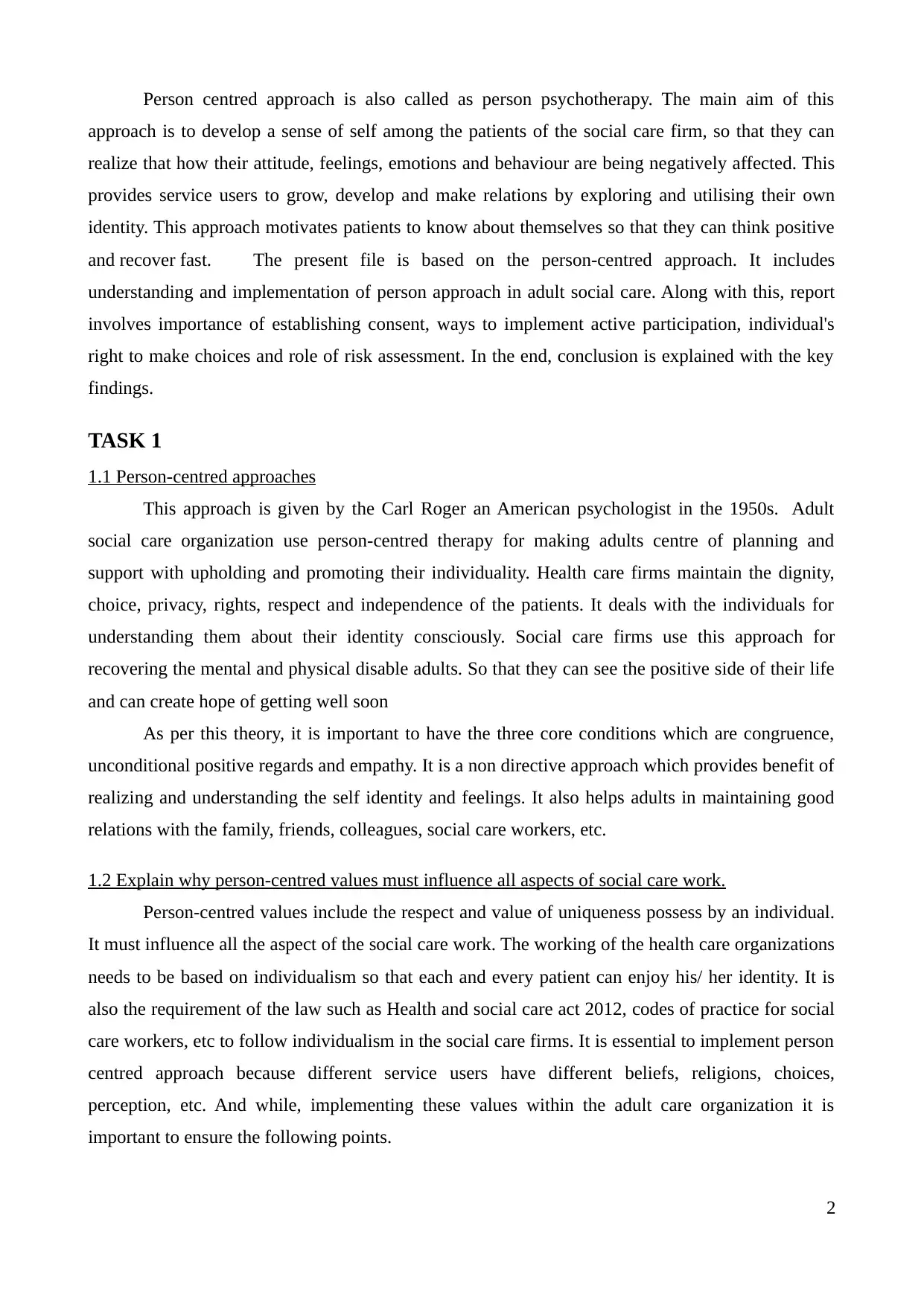
Person centred approach is also called as person psychotherapy. The main aim of this
approach is to develop a sense of self among the patients of the social care firm, so that they can
realize that how their attitude, feelings, emotions and behaviour are being negatively affected. This
provides service users to grow, develop and make relations by exploring and utilising their own
identity. This approach motivates patients to know about themselves so that they can think positive
and recover fast. The present file is based on the person-centred approach. It includes
understanding and implementation of person approach in adult social care. Along with this, report
involves importance of establishing consent, ways to implement active participation, individual's
right to make choices and role of risk assessment. In the end, conclusion is explained with the key
findings.
TASK 1
1.1 Person-centred approaches
This approach is given by the Carl Roger an American psychologist in the 1950s. Adult
social care organization use person-centred therapy for making adults centre of planning and
support with upholding and promoting their individuality. Health care firms maintain the dignity,
choice, privacy, rights, respect and independence of the patients. It deals with the individuals for
understanding them about their identity consciously. Social care firms use this approach for
recovering the mental and physical disable adults. So that they can see the positive side of their life
and can create hope of getting well soon
As per this theory, it is important to have the three core conditions which are congruence,
unconditional positive regards and empathy. It is a non directive approach which provides benefit of
realizing and understanding the self identity and feelings. It also helps adults in maintaining good
relations with the family, friends, colleagues, social care workers, etc.
1.2 Explain why person-centred values must influence all aspects of social care work.
Person-centred values include the respect and value of uniqueness possess by an individual.
It must influence all the aspect of the social care work. The working of the health care organizations
needs to be based on individualism so that each and every patient can enjoy his/ her identity. It is
also the requirement of the law such as Health and social care act 2012, codes of practice for social
care workers, etc to follow individualism in the social care firms. It is essential to implement person
centred approach because different service users have different beliefs, religions, choices,
perception, etc. And while, implementing these values within the adult care organization it is
important to ensure the following points.
2
approach is to develop a sense of self among the patients of the social care firm, so that they can
realize that how their attitude, feelings, emotions and behaviour are being negatively affected. This
provides service users to grow, develop and make relations by exploring and utilising their own
identity. This approach motivates patients to know about themselves so that they can think positive
and recover fast. The present file is based on the person-centred approach. It includes
understanding and implementation of person approach in adult social care. Along with this, report
involves importance of establishing consent, ways to implement active participation, individual's
right to make choices and role of risk assessment. In the end, conclusion is explained with the key
findings.
TASK 1
1.1 Person-centred approaches
This approach is given by the Carl Roger an American psychologist in the 1950s. Adult
social care organization use person-centred therapy for making adults centre of planning and
support with upholding and promoting their individuality. Health care firms maintain the dignity,
choice, privacy, rights, respect and independence of the patients. It deals with the individuals for
understanding them about their identity consciously. Social care firms use this approach for
recovering the mental and physical disable adults. So that they can see the positive side of their life
and can create hope of getting well soon
As per this theory, it is important to have the three core conditions which are congruence,
unconditional positive regards and empathy. It is a non directive approach which provides benefit of
realizing and understanding the self identity and feelings. It also helps adults in maintaining good
relations with the family, friends, colleagues, social care workers, etc.
1.2 Explain why person-centred values must influence all aspects of social care work.
Person-centred values include the respect and value of uniqueness possess by an individual.
It must influence all the aspect of the social care work. The working of the health care organizations
needs to be based on individualism so that each and every patient can enjoy his/ her identity. It is
also the requirement of the law such as Health and social care act 2012, codes of practice for social
care workers, etc to follow individualism in the social care firms. It is essential to implement person
centred approach because different service users have different beliefs, religions, choices,
perception, etc. And while, implementing these values within the adult care organization it is
important to ensure the following points.
2
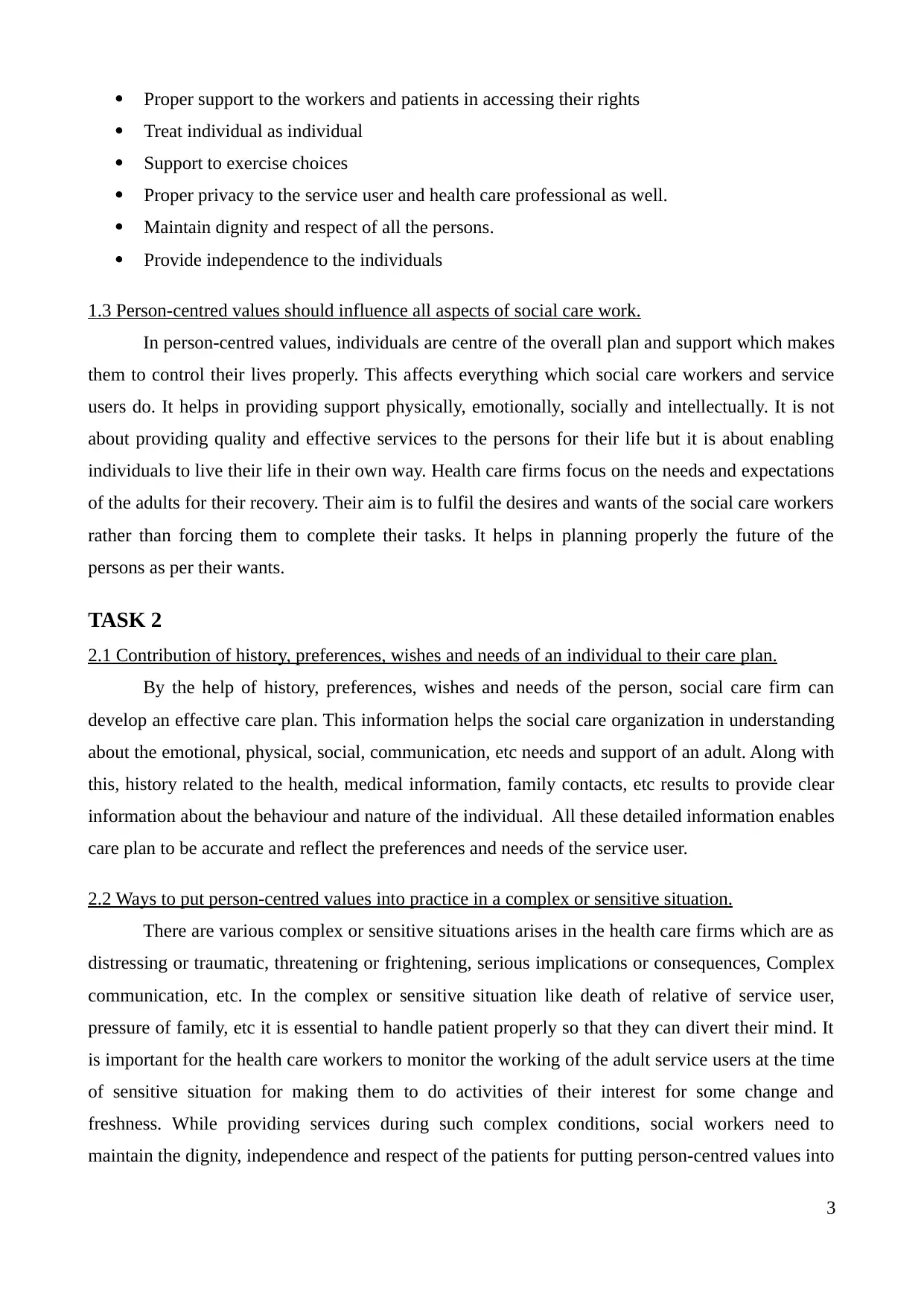
Proper support to the workers and patients in accessing their rights
Treat individual as individual
Support to exercise choices
Proper privacy to the service user and health care professional as well.
Maintain dignity and respect of all the persons.
Provide independence to the individuals
1.3 Person-centred values should influence all aspects of social care work.
In person-centred values, individuals are centre of the overall plan and support which makes
them to control their lives properly. This affects everything which social care workers and service
users do. It helps in providing support physically, emotionally, socially and intellectually. It is not
about providing quality and effective services to the persons for their life but it is about enabling
individuals to live their life in their own way. Health care firms focus on the needs and expectations
of the adults for their recovery. Their aim is to fulfil the desires and wants of the social care workers
rather than forcing them to complete their tasks. It helps in planning properly the future of the
persons as per their wants.
TASK 2
2.1 Contribution of history, preferences, wishes and needs of an individual to their care plan.
By the help of history, preferences, wishes and needs of the person, social care firm can
develop an effective care plan. This information helps the social care organization in understanding
about the emotional, physical, social, communication, etc needs and support of an adult. Along with
this, history related to the health, medical information, family contacts, etc results to provide clear
information about the behaviour and nature of the individual. All these detailed information enables
care plan to be accurate and reflect the preferences and needs of the service user.
2.2 Ways to put person-centred values into practice in a complex or sensitive situation.
There are various complex or sensitive situations arises in the health care firms which are as
distressing or traumatic, threatening or frightening, serious implications or consequences, Complex
communication, etc. In the complex or sensitive situation like death of relative of service user,
pressure of family, etc it is essential to handle patient properly so that they can divert their mind. It
is important for the health care workers to monitor the working of the adult service users at the time
of sensitive situation for making them to do activities of their interest for some change and
freshness. While providing services during such complex conditions, social workers need to
maintain the dignity, independence and respect of the patients for putting person-centred values into
3
Treat individual as individual
Support to exercise choices
Proper privacy to the service user and health care professional as well.
Maintain dignity and respect of all the persons.
Provide independence to the individuals
1.3 Person-centred values should influence all aspects of social care work.
In person-centred values, individuals are centre of the overall plan and support which makes
them to control their lives properly. This affects everything which social care workers and service
users do. It helps in providing support physically, emotionally, socially and intellectually. It is not
about providing quality and effective services to the persons for their life but it is about enabling
individuals to live their life in their own way. Health care firms focus on the needs and expectations
of the adults for their recovery. Their aim is to fulfil the desires and wants of the social care workers
rather than forcing them to complete their tasks. It helps in planning properly the future of the
persons as per their wants.
TASK 2
2.1 Contribution of history, preferences, wishes and needs of an individual to their care plan.
By the help of history, preferences, wishes and needs of the person, social care firm can
develop an effective care plan. This information helps the social care organization in understanding
about the emotional, physical, social, communication, etc needs and support of an adult. Along with
this, history related to the health, medical information, family contacts, etc results to provide clear
information about the behaviour and nature of the individual. All these detailed information enables
care plan to be accurate and reflect the preferences and needs of the service user.
2.2 Ways to put person-centred values into practice in a complex or sensitive situation.
There are various complex or sensitive situations arises in the health care firms which are as
distressing or traumatic, threatening or frightening, serious implications or consequences, Complex
communication, etc. In the complex or sensitive situation like death of relative of service user,
pressure of family, etc it is essential to handle patient properly so that they can divert their mind. It
is important for the health care workers to monitor the working of the adult service users at the time
of sensitive situation for making them to do activities of their interest for some change and
freshness. While providing services during such complex conditions, social workers need to
maintain the dignity, independence and respect of the patients for putting person-centred values into
3
⊘ This is a preview!⊘
Do you want full access?
Subscribe today to unlock all pages.

Trusted by 1+ million students worldwide
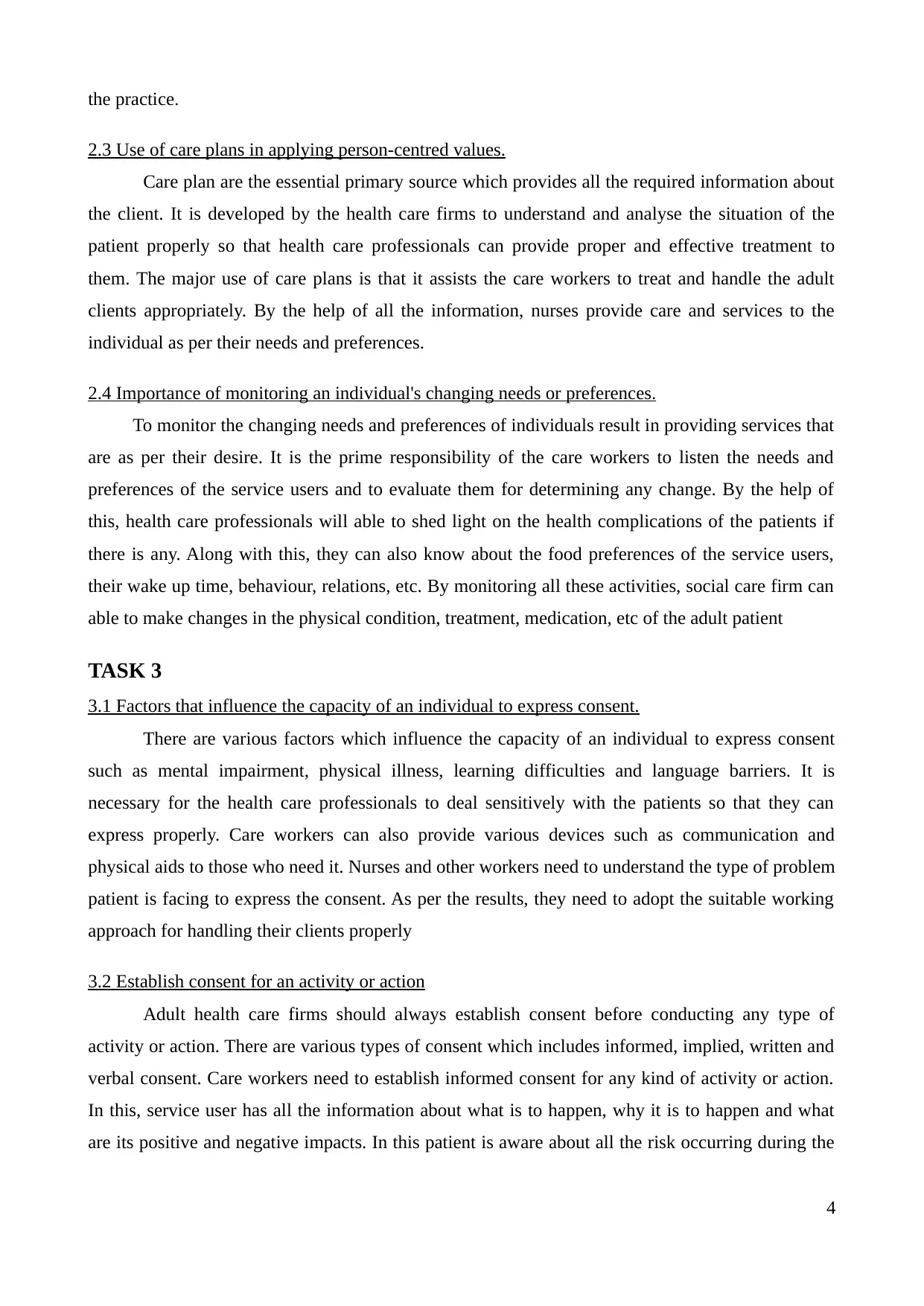
the practice.
2.3 Use of care plans in applying person-centred values.
Care plan are the essential primary source which provides all the required information about
the client. It is developed by the health care firms to understand and analyse the situation of the
patient properly so that health care professionals can provide proper and effective treatment to
them. The major use of care plans is that it assists the care workers to treat and handle the adult
clients appropriately. By the help of all the information, nurses provide care and services to the
individual as per their needs and preferences.
2.4 Importance of monitoring an individual's changing needs or preferences.
To monitor the changing needs and preferences of individuals result in providing services that
are as per their desire. It is the prime responsibility of the care workers to listen the needs and
preferences of the service users and to evaluate them for determining any change. By the help of
this, health care professionals will able to shed light on the health complications of the patients if
there is any. Along with this, they can also know about the food preferences of the service users,
their wake up time, behaviour, relations, etc. By monitoring all these activities, social care firm can
able to make changes in the physical condition, treatment, medication, etc of the adult patient
TASK 3
3.1 Factors that influence the capacity of an individual to express consent.
There are various factors which influence the capacity of an individual to express consent
such as mental impairment, physical illness, learning difficulties and language barriers. It is
necessary for the health care professionals to deal sensitively with the patients so that they can
express properly. Care workers can also provide various devices such as communication and
physical aids to those who need it. Nurses and other workers need to understand the type of problem
patient is facing to express the consent. As per the results, they need to adopt the suitable working
approach for handling their clients properly
3.2 Establish consent for an activity or action
Adult health care firms should always establish consent before conducting any type of
activity or action. There are various types of consent which includes informed, implied, written and
verbal consent. Care workers need to establish informed consent for any kind of activity or action.
In this, service user has all the information about what is to happen, why it is to happen and what
are its positive and negative impacts. In this patient is aware about all the risk occurring during the
4
2.3 Use of care plans in applying person-centred values.
Care plan are the essential primary source which provides all the required information about
the client. It is developed by the health care firms to understand and analyse the situation of the
patient properly so that health care professionals can provide proper and effective treatment to
them. The major use of care plans is that it assists the care workers to treat and handle the adult
clients appropriately. By the help of all the information, nurses provide care and services to the
individual as per their needs and preferences.
2.4 Importance of monitoring an individual's changing needs or preferences.
To monitor the changing needs and preferences of individuals result in providing services that
are as per their desire. It is the prime responsibility of the care workers to listen the needs and
preferences of the service users and to evaluate them for determining any change. By the help of
this, health care professionals will able to shed light on the health complications of the patients if
there is any. Along with this, they can also know about the food preferences of the service users,
their wake up time, behaviour, relations, etc. By monitoring all these activities, social care firm can
able to make changes in the physical condition, treatment, medication, etc of the adult patient
TASK 3
3.1 Factors that influence the capacity of an individual to express consent.
There are various factors which influence the capacity of an individual to express consent
such as mental impairment, physical illness, learning difficulties and language barriers. It is
necessary for the health care professionals to deal sensitively with the patients so that they can
express properly. Care workers can also provide various devices such as communication and
physical aids to those who need it. Nurses and other workers need to understand the type of problem
patient is facing to express the consent. As per the results, they need to adopt the suitable working
approach for handling their clients properly
3.2 Establish consent for an activity or action
Adult health care firms should always establish consent before conducting any type of
activity or action. There are various types of consent which includes informed, implied, written and
verbal consent. Care workers need to establish informed consent for any kind of activity or action.
In this, service user has all the information about what is to happen, why it is to happen and what
are its positive and negative impacts. In this patient is aware about all the risk occurring during the
4
Paraphrase This Document
Need a fresh take? Get an instant paraphrase of this document with our AI Paraphraser
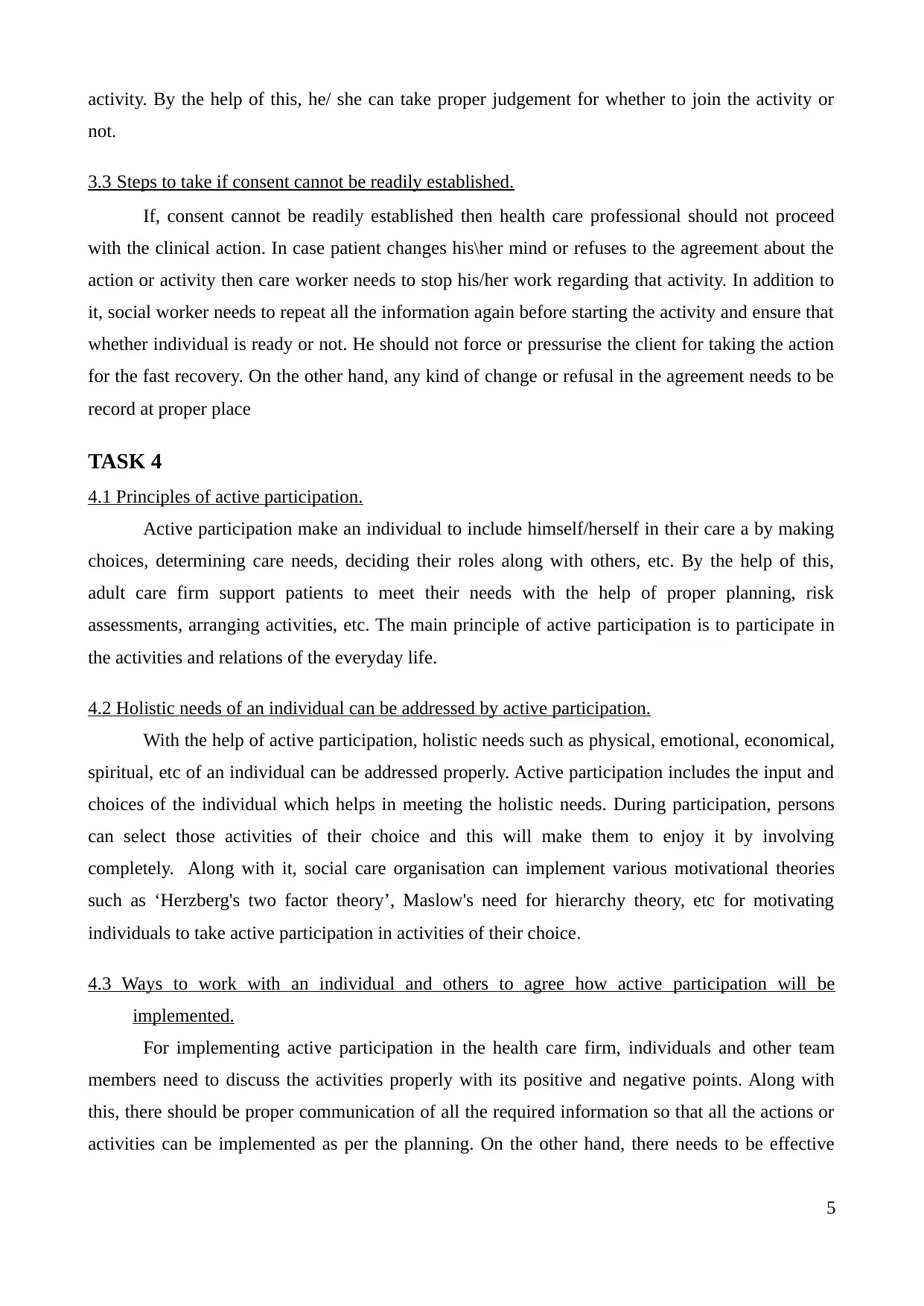
activity. By the help of this, he/ she can take proper judgement for whether to join the activity or
not.
3.3 Steps to take if consent cannot be readily established.
If, consent cannot be readily established then health care professional should not proceed
with the clinical action. In case patient changes his\her mind or refuses to the agreement about the
action or activity then care worker needs to stop his/her work regarding that activity. In addition to
it, social worker needs to repeat all the information again before starting the activity and ensure that
whether individual is ready or not. He should not force or pressurise the client for taking the action
for the fast recovery. On the other hand, any kind of change or refusal in the agreement needs to be
record at proper place
TASK 4
4.1 Principles of active participation.
Active participation make an individual to include himself/herself in their care a by making
choices, determining care needs, deciding their roles along with others, etc. By the help of this,
adult care firm support patients to meet their needs with the help of proper planning, risk
assessments, arranging activities, etc. The main principle of active participation is to participate in
the activities and relations of the everyday life.
4.2 Holistic needs of an individual can be addressed by active participation.
With the help of active participation, holistic needs such as physical, emotional, economical,
spiritual, etc of an individual can be addressed properly. Active participation includes the input and
choices of the individual which helps in meeting the holistic needs. During participation, persons
can select those activities of their choice and this will make them to enjoy it by involving
completely. Along with it, social care organisation can implement various motivational theories
such as ‘Herzberg's two factor theory’, Maslow's need for hierarchy theory, etc for motivating
individuals to take active participation in activities of their choice.
4.3 Ways to work with an individual and others to agree how active participation will be
implemented.
For implementing active participation in the health care firm, individuals and other team
members need to discuss the activities properly with its positive and negative points. Along with
this, there should be proper communication of all the required information so that all the actions or
activities can be implemented as per the planning. On the other hand, there needs to be effective
5
not.
3.3 Steps to take if consent cannot be readily established.
If, consent cannot be readily established then health care professional should not proceed
with the clinical action. In case patient changes his\her mind or refuses to the agreement about the
action or activity then care worker needs to stop his/her work regarding that activity. In addition to
it, social worker needs to repeat all the information again before starting the activity and ensure that
whether individual is ready or not. He should not force or pressurise the client for taking the action
for the fast recovery. On the other hand, any kind of change or refusal in the agreement needs to be
record at proper place
TASK 4
4.1 Principles of active participation.
Active participation make an individual to include himself/herself in their care a by making
choices, determining care needs, deciding their roles along with others, etc. By the help of this,
adult care firm support patients to meet their needs with the help of proper planning, risk
assessments, arranging activities, etc. The main principle of active participation is to participate in
the activities and relations of the everyday life.
4.2 Holistic needs of an individual can be addressed by active participation.
With the help of active participation, holistic needs such as physical, emotional, economical,
spiritual, etc of an individual can be addressed properly. Active participation includes the input and
choices of the individual which helps in meeting the holistic needs. During participation, persons
can select those activities of their choice and this will make them to enjoy it by involving
completely. Along with it, social care organisation can implement various motivational theories
such as ‘Herzberg's two factor theory’, Maslow's need for hierarchy theory, etc for motivating
individuals to take active participation in activities of their choice.
4.3 Ways to work with an individual and others to agree how active participation will be
implemented.
For implementing active participation in the health care firm, individuals and other team
members need to discuss the activities properly with its positive and negative points. Along with
this, there should be proper communication of all the required information so that all the actions or
activities can be implemented as per the planning. On the other hand, there needs to be effective
5
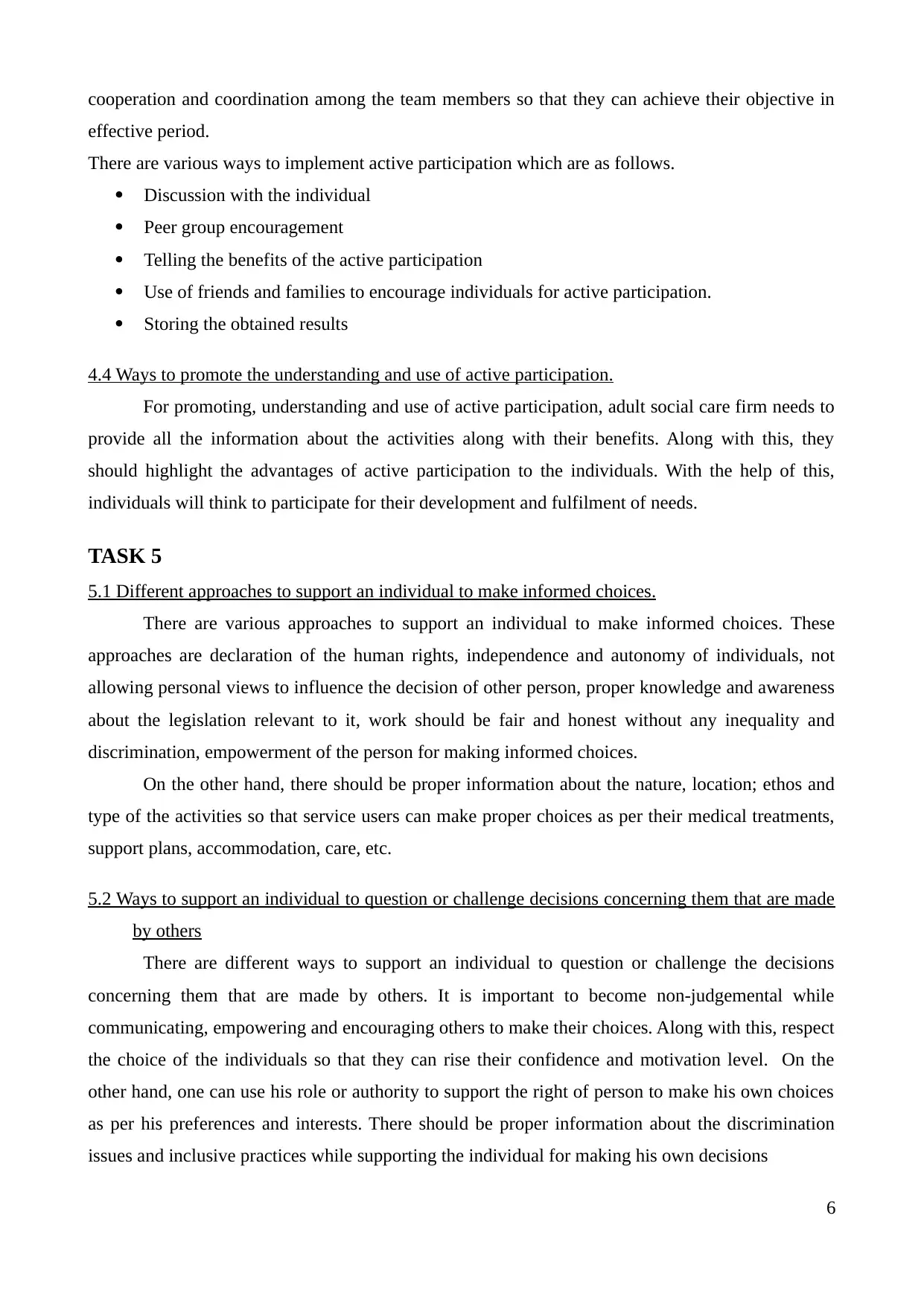
cooperation and coordination among the team members so that they can achieve their objective in
effective period.
There are various ways to implement active participation which are as follows.
Discussion with the individual
Peer group encouragement
Telling the benefits of the active participation
Use of friends and families to encourage individuals for active participation.
Storing the obtained results
4.4 Ways to promote the understanding and use of active participation.
For promoting, understanding and use of active participation, adult social care firm needs to
provide all the information about the activities along with their benefits. Along with this, they
should highlight the advantages of active participation to the individuals. With the help of this,
individuals will think to participate for their development and fulfilment of needs.
TASK 5
5.1 Different approaches to support an individual to make informed choices.
There are various approaches to support an individual to make informed choices. These
approaches are declaration of the human rights, independence and autonomy of individuals, not
allowing personal views to influence the decision of other person, proper knowledge and awareness
about the legislation relevant to it, work should be fair and honest without any inequality and
discrimination, empowerment of the person for making informed choices.
On the other hand, there should be proper information about the nature, location; ethos and
type of the activities so that service users can make proper choices as per their medical treatments,
support plans, accommodation, care, etc.
5.2 Ways to support an individual to question or challenge decisions concerning them that are made
by others
There are different ways to support an individual to question or challenge the decisions
concerning them that are made by others. It is important to become non-judgemental while
communicating, empowering and encouraging others to make their choices. Along with this, respect
the choice of the individuals so that they can rise their confidence and motivation level. On the
other hand, one can use his role or authority to support the right of person to make his own choices
as per his preferences and interests. There should be proper information about the discrimination
issues and inclusive practices while supporting the individual for making his own decisions
6
effective period.
There are various ways to implement active participation which are as follows.
Discussion with the individual
Peer group encouragement
Telling the benefits of the active participation
Use of friends and families to encourage individuals for active participation.
Storing the obtained results
4.4 Ways to promote the understanding and use of active participation.
For promoting, understanding and use of active participation, adult social care firm needs to
provide all the information about the activities along with their benefits. Along with this, they
should highlight the advantages of active participation to the individuals. With the help of this,
individuals will think to participate for their development and fulfilment of needs.
TASK 5
5.1 Different approaches to support an individual to make informed choices.
There are various approaches to support an individual to make informed choices. These
approaches are declaration of the human rights, independence and autonomy of individuals, not
allowing personal views to influence the decision of other person, proper knowledge and awareness
about the legislation relevant to it, work should be fair and honest without any inequality and
discrimination, empowerment of the person for making informed choices.
On the other hand, there should be proper information about the nature, location; ethos and
type of the activities so that service users can make proper choices as per their medical treatments,
support plans, accommodation, care, etc.
5.2 Ways to support an individual to question or challenge decisions concerning them that are made
by others
There are different ways to support an individual to question or challenge the decisions
concerning them that are made by others. It is important to become non-judgemental while
communicating, empowering and encouraging others to make their choices. Along with this, respect
the choice of the individuals so that they can rise their confidence and motivation level. On the
other hand, one can use his role or authority to support the right of person to make his own choices
as per his preferences and interests. There should be proper information about the discrimination
issues and inclusive practices while supporting the individual for making his own decisions
6
⊘ This is a preview!⊘
Do you want full access?
Subscribe today to unlock all pages.

Trusted by 1+ million students worldwide
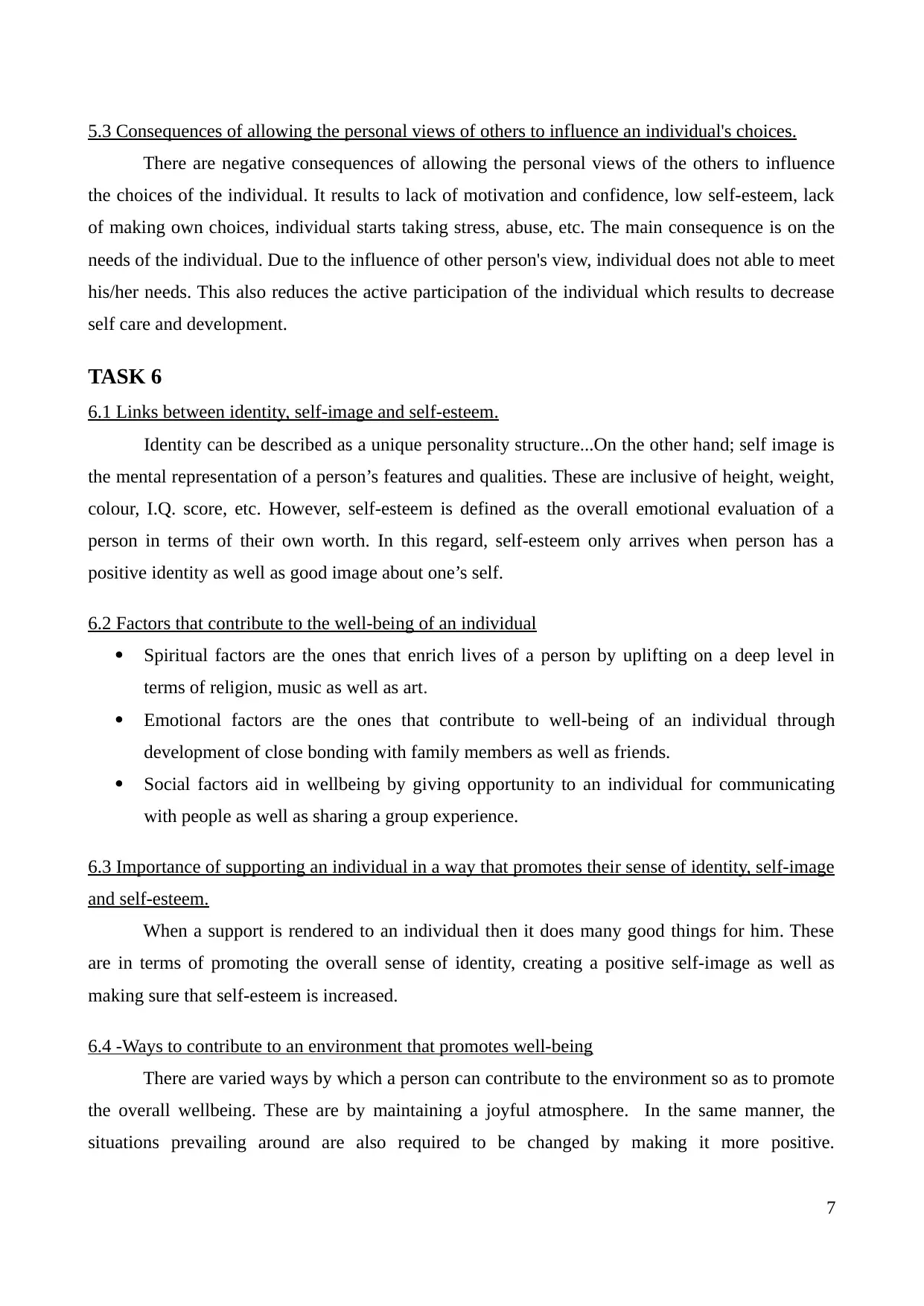
5.3 Consequences of allowing the personal views of others to influence an individual's choices.
There are negative consequences of allowing the personal views of the others to influence
the choices of the individual. It results to lack of motivation and confidence, low self-esteem, lack
of making own choices, individual starts taking stress, abuse, etc. The main consequence is on the
needs of the individual. Due to the influence of other person's view, individual does not able to meet
his/her needs. This also reduces the active participation of the individual which results to decrease
self care and development.
TASK 6
6.1 Links between identity, self-image and self-esteem.
Identity can be described as a unique personality structure...On the other hand; self image is
the mental representation of a person’s features and qualities. These are inclusive of height, weight,
colour, I.Q. score, etc. However, self-esteem is defined as the overall emotional evaluation of a
person in terms of their own worth. In this regard, self-esteem only arrives when person has a
positive identity as well as good image about one’s self.
6.2 Factors that contribute to the well-being of an individual
Spiritual factors are the ones that enrich lives of a person by uplifting on a deep level in
terms of religion, music as well as art.
Emotional factors are the ones that contribute to well-being of an individual through
development of close bonding with family members as well as friends.
Social factors aid in wellbeing by giving opportunity to an individual for communicating
with people as well as sharing a group experience.
6.3 Importance of supporting an individual in a way that promotes their sense of identity, self-image
and self-esteem.
When a support is rendered to an individual then it does many good things for him. These
are in terms of promoting the overall sense of identity, creating a positive self-image as well as
making sure that self-esteem is increased.
6.4 -Ways to contribute to an environment that promotes well-being
There are varied ways by which a person can contribute to the environment so as to promote
the overall wellbeing. These are by maintaining a joyful atmosphere. In the same manner, the
situations prevailing around are also required to be changed by making it more positive.
7
There are negative consequences of allowing the personal views of the others to influence
the choices of the individual. It results to lack of motivation and confidence, low self-esteem, lack
of making own choices, individual starts taking stress, abuse, etc. The main consequence is on the
needs of the individual. Due to the influence of other person's view, individual does not able to meet
his/her needs. This also reduces the active participation of the individual which results to decrease
self care and development.
TASK 6
6.1 Links between identity, self-image and self-esteem.
Identity can be described as a unique personality structure...On the other hand; self image is
the mental representation of a person’s features and qualities. These are inclusive of height, weight,
colour, I.Q. score, etc. However, self-esteem is defined as the overall emotional evaluation of a
person in terms of their own worth. In this regard, self-esteem only arrives when person has a
positive identity as well as good image about one’s self.
6.2 Factors that contribute to the well-being of an individual
Spiritual factors are the ones that enrich lives of a person by uplifting on a deep level in
terms of religion, music as well as art.
Emotional factors are the ones that contribute to well-being of an individual through
development of close bonding with family members as well as friends.
Social factors aid in wellbeing by giving opportunity to an individual for communicating
with people as well as sharing a group experience.
6.3 Importance of supporting an individual in a way that promotes their sense of identity, self-image
and self-esteem.
When a support is rendered to an individual then it does many good things for him. These
are in terms of promoting the overall sense of identity, creating a positive self-image as well as
making sure that self-esteem is increased.
6.4 -Ways to contribute to an environment that promotes well-being
There are varied ways by which a person can contribute to the environment so as to promote
the overall wellbeing. These are by maintaining a joyful atmosphere. In the same manner, the
situations prevailing around are also required to be changed by making it more positive.
7
Paraphrase This Document
Need a fresh take? Get an instant paraphrase of this document with our AI Paraphraser
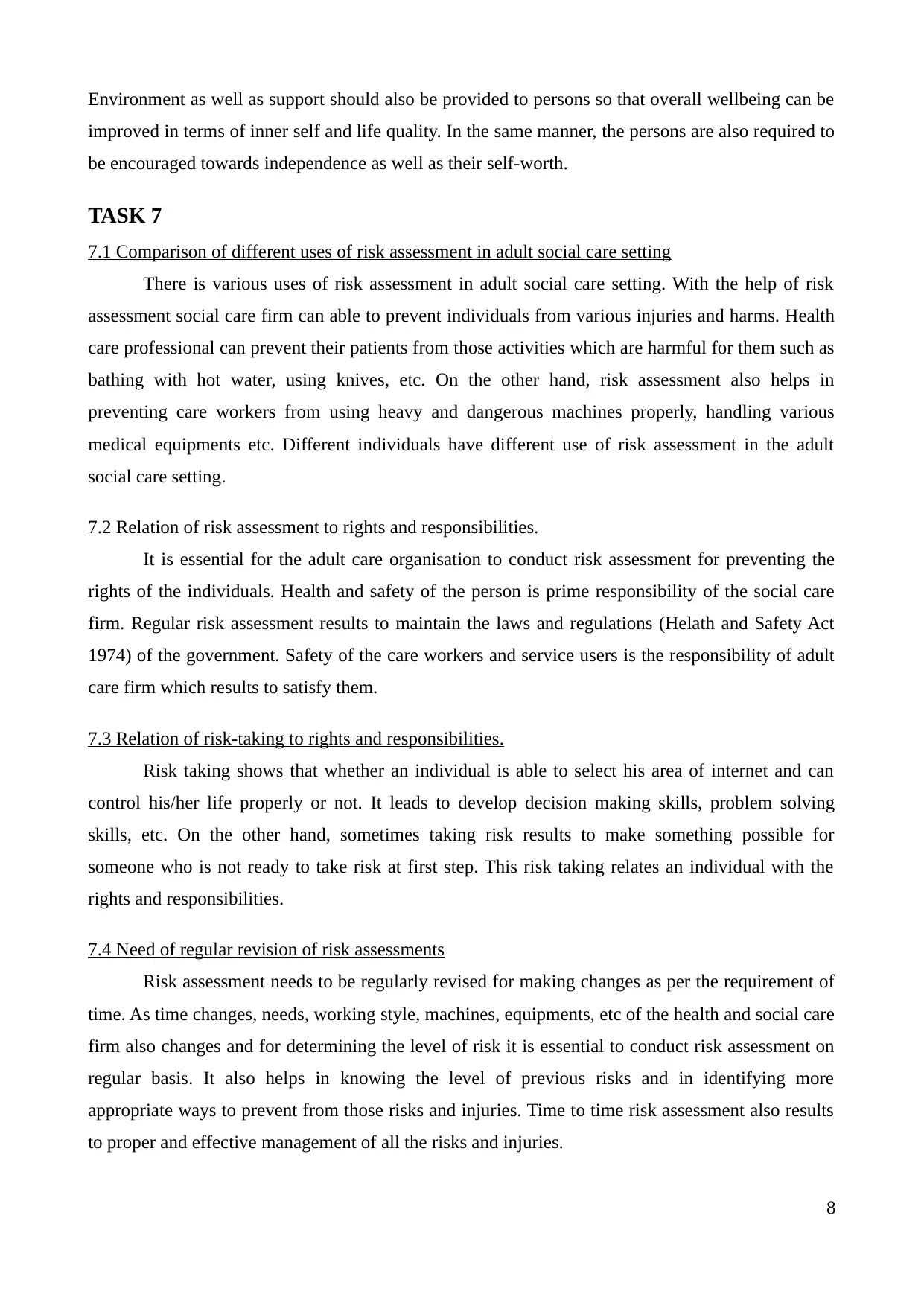
Environment as well as support should also be provided to persons so that overall wellbeing can be
improved in terms of inner self and life quality. In the same manner, the persons are also required to
be encouraged towards independence as well as their self-worth.
TASK 7
7.1 Comparison of different uses of risk assessment in adult social care setting
There is various uses of risk assessment in adult social care setting. With the help of risk
assessment social care firm can able to prevent individuals from various injuries and harms. Health
care professional can prevent their patients from those activities which are harmful for them such as
bathing with hot water, using knives, etc. On the other hand, risk assessment also helps in
preventing care workers from using heavy and dangerous machines properly, handling various
medical equipments etc. Different individuals have different use of risk assessment in the adult
social care setting.
7.2 Relation of risk assessment to rights and responsibilities.
It is essential for the adult care organisation to conduct risk assessment for preventing the
rights of the individuals. Health and safety of the person is prime responsibility of the social care
firm. Regular risk assessment results to maintain the laws and regulations (Helath and Safety Act
1974) of the government. Safety of the care workers and service users is the responsibility of adult
care firm which results to satisfy them.
7.3 Relation of risk-taking to rights and responsibilities.
Risk taking shows that whether an individual is able to select his area of internet and can
control his/her life properly or not. It leads to develop decision making skills, problem solving
skills, etc. On the other hand, sometimes taking risk results to make something possible for
someone who is not ready to take risk at first step. This risk taking relates an individual with the
rights and responsibilities.
7.4 Need of regular revision of risk assessments
Risk assessment needs to be regularly revised for making changes as per the requirement of
time. As time changes, needs, working style, machines, equipments, etc of the health and social care
firm also changes and for determining the level of risk it is essential to conduct risk assessment on
regular basis. It also helps in knowing the level of previous risks and in identifying more
appropriate ways to prevent from those risks and injuries. Time to time risk assessment also results
to proper and effective management of all the risks and injuries.
8
improved in terms of inner self and life quality. In the same manner, the persons are also required to
be encouraged towards independence as well as their self-worth.
TASK 7
7.1 Comparison of different uses of risk assessment in adult social care setting
There is various uses of risk assessment in adult social care setting. With the help of risk
assessment social care firm can able to prevent individuals from various injuries and harms. Health
care professional can prevent their patients from those activities which are harmful for them such as
bathing with hot water, using knives, etc. On the other hand, risk assessment also helps in
preventing care workers from using heavy and dangerous machines properly, handling various
medical equipments etc. Different individuals have different use of risk assessment in the adult
social care setting.
7.2 Relation of risk assessment to rights and responsibilities.
It is essential for the adult care organisation to conduct risk assessment for preventing the
rights of the individuals. Health and safety of the person is prime responsibility of the social care
firm. Regular risk assessment results to maintain the laws and regulations (Helath and Safety Act
1974) of the government. Safety of the care workers and service users is the responsibility of adult
care firm which results to satisfy them.
7.3 Relation of risk-taking to rights and responsibilities.
Risk taking shows that whether an individual is able to select his area of internet and can
control his/her life properly or not. It leads to develop decision making skills, problem solving
skills, etc. On the other hand, sometimes taking risk results to make something possible for
someone who is not ready to take risk at first step. This risk taking relates an individual with the
rights and responsibilities.
7.4 Need of regular revision of risk assessments
Risk assessment needs to be regularly revised for making changes as per the requirement of
time. As time changes, needs, working style, machines, equipments, etc of the health and social care
firm also changes and for determining the level of risk it is essential to conduct risk assessment on
regular basis. It also helps in knowing the level of previous risks and in identifying more
appropriate ways to prevent from those risks and injuries. Time to time risk assessment also results
to proper and effective management of all the risks and injuries.
8
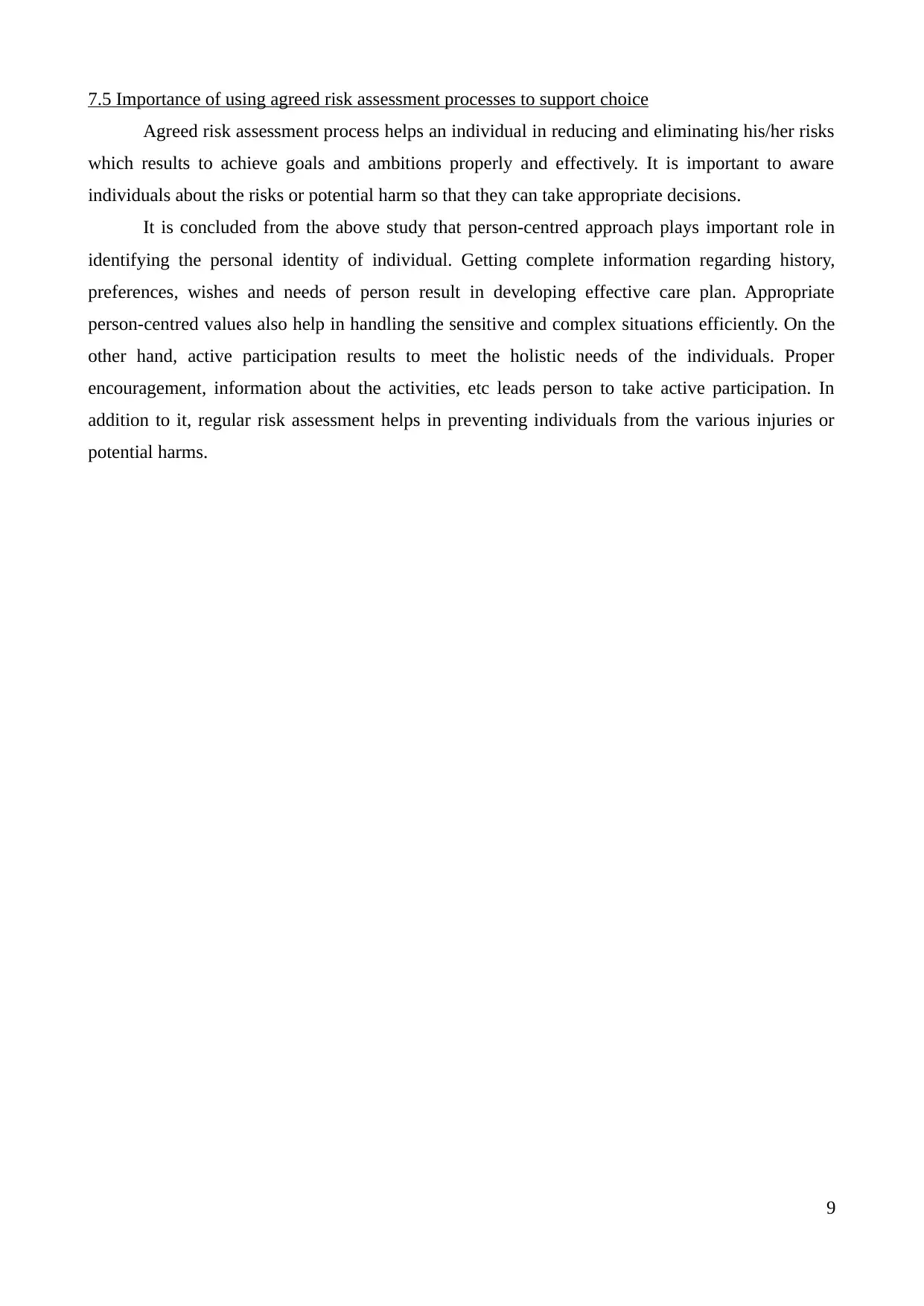
7.5 Importance of using agreed risk assessment processes to support choice
Agreed risk assessment process helps an individual in reducing and eliminating his/her risks
which results to achieve goals and ambitions properly and effectively. It is important to aware
individuals about the risks or potential harm so that they can take appropriate decisions.
It is concluded from the above study that person-centred approach plays important role in
identifying the personal identity of individual. Getting complete information regarding history,
preferences, wishes and needs of person result in developing effective care plan. Appropriate
person-centred values also help in handling the sensitive and complex situations efficiently. On the
other hand, active participation results to meet the holistic needs of the individuals. Proper
encouragement, information about the activities, etc leads person to take active participation. In
addition to it, regular risk assessment helps in preventing individuals from the various injuries or
potential harms.
9
Agreed risk assessment process helps an individual in reducing and eliminating his/her risks
which results to achieve goals and ambitions properly and effectively. It is important to aware
individuals about the risks or potential harm so that they can take appropriate decisions.
It is concluded from the above study that person-centred approach plays important role in
identifying the personal identity of individual. Getting complete information regarding history,
preferences, wishes and needs of person result in developing effective care plan. Appropriate
person-centred values also help in handling the sensitive and complex situations efficiently. On the
other hand, active participation results to meet the holistic needs of the individuals. Proper
encouragement, information about the activities, etc leads person to take active participation. In
addition to it, regular risk assessment helps in preventing individuals from the various injuries or
potential harms.
9
⊘ This is a preview!⊘
Do you want full access?
Subscribe today to unlock all pages.

Trusted by 1+ million students worldwide
1 out of 9
Related Documents
Your All-in-One AI-Powered Toolkit for Academic Success.
+13062052269
info@desklib.com
Available 24*7 on WhatsApp / Email
![[object Object]](/_next/static/media/star-bottom.7253800d.svg)
Unlock your academic potential
Copyright © 2020–2026 A2Z Services. All Rights Reserved. Developed and managed by ZUCOL.





